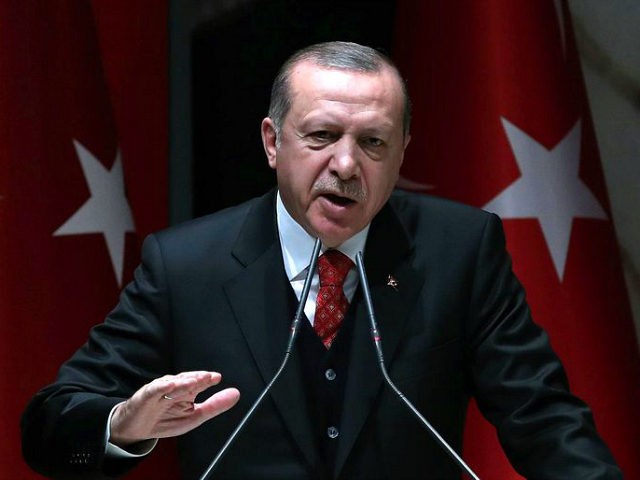Turkish President Recep Tayyip Erdogan vowed on Monday to annihilate a 30,000-strong Kurdish-majority force in Syria that has the backing of the United States.
The U.S.-led coalition is expected to deploy the new “Border Security Force,” largely made up of members of the Syrian Kurdish People’s Protection Units (YPG/YPJ), to the Turkey-Syria border soon.
“The US has admitted to setting up a terrorist army along our country’s borders. Then, our role is to choke this army of terror before it is born,” declared an angered President Erdogan, reports Kurdistan 24.
Ibrahim Kalin, a spokesman for Erdogan, also said Turkey has the right to defend itself against “terror groups” on its terms and time, adding that the U.S.-backed Kurdish force is “unacceptable,” notes Reuters, citing the state-run Anadolu Agency.
“Turkey will continue to take all necessary precautions aligned with its national interest to preserve its national security,” added the spokesman.
Turkey has long considered the Kurdish Democratic Union Party (PYD) and its armed wing, the YPG, to be terrorists.
Nevertheless, Syrian Kurdish troops have been leading the Syrian Democratic Forces (SDF), a Kurdish-Arab alliance made up mostly of YPG troops, in ongoing efforts to push the Islamic State (ISIS/ISIL) out of Syria.
The anti-ISIS U.S.-led coalition’s support for the Syrian Kurds has strained relations between NATO allies Turkey and the United States.
Meanwhile, Russia and Turkey have grown closer, allegedly working together to end the Syrian civil war.
To the dismay of Turkey and Russia, the U.S.-led coalition is now working with the SDF to set up a new border force of 30,000 troops, which Erdogan dismissed as “a horde of murderers,” warning the United States that Ankara would not be “responsible for unwanted consequences.”
“The coalition is working jointly with the SDF to establish and train the new Syrian Border Security Force (BSF),” Ryan Dillon, spokesman for the U.S.-led coalition, revealed in a statement.
Reuters reports:
The force will be deployed along the border with Turkey to the north, the Iraqi border to the southeast, and along the Euphrates River Valley, which broadly acts as the dividing line separating the U.S.-backed SDF and Syrian government forces backed by Iran and Russia.
The [U.S.-led] coalition said the BSF would operate under SDF command and around 230 individuals were currently undergoing training in its inaugural class.
Citing a statement from the coalition’s Public Affairs Office, Reuters explains that the border force “will be providing border security through professionally securing checkpoints and conducting counter-IED [improvised explosive devices] operations.”
Russia, which has helped Syrian dictator Assad stay in power, has come out against the U.S.-supported border force, claiming it could lead to the partition of Syria.
Syrian Kurds have already combined Kurdish-led autonomous areas in northern Syria into an independent federal system.
“The [U.S.] actions that we have been observing indicate that the U.S. does not want to keep Syria as a state in its current borders … The U.S. wants to help the Syrian Democratic Forces (SDF) to set up some border security zones,” proclaimed Russian Foreign Minister Sergei Lavrov on January 15.
“There is a fear that they are pursuing a policy to cut Syria into several pieces,” added Lavrov.
The Russian minister acknowledged that America’s “unilateral” army plan might harm Turkey’s relations with Kurds.
Last month, Russia claimed it would start to withdraw its troops from Syria, adding that it would keep operating some bases in the country “on a permanent basis.”
Although ISIS has lost significant territory to the U.S.-led coalition and its allies, including the Kurds, as well as to the Iran and Russian-backed Assad troops, some Kurds believe the fight in Syria is far from over.
“The [ISIS] campaign is not over. Now, the more difficult phase has started,” Aldar Khalil, a member of the Movement for a Democratic Society (TEV-DEM), an umbrella group made up of various political parties, including the PYD, told Reuters.
He predicted that the Syrian conflict may even “grind on” until 2025, adding that the offensive against ISIS is nowhere in sight.

COMMENTS
Please let us know if you're having issues with commenting.